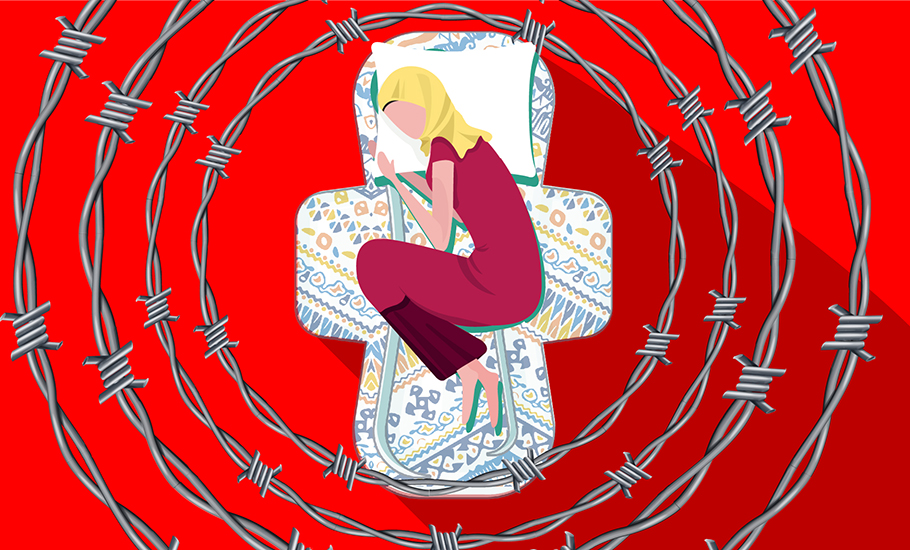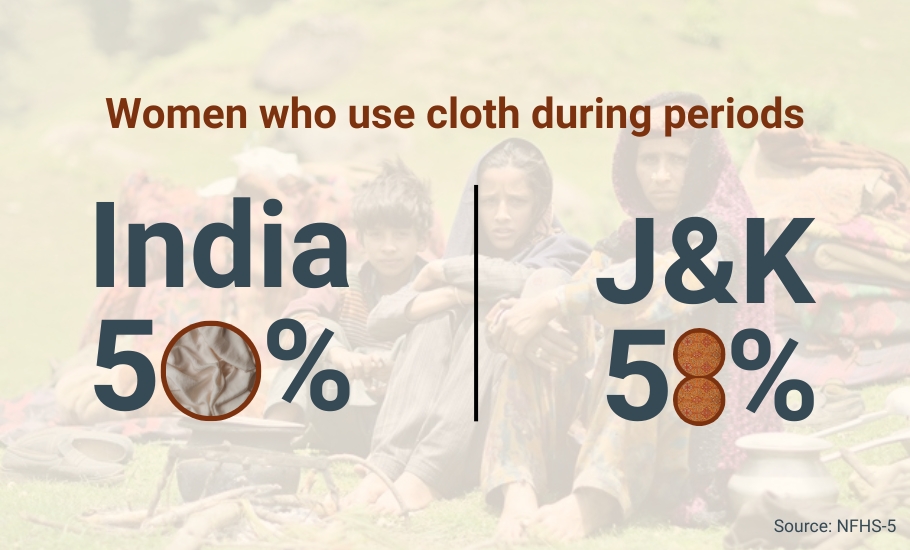
Shame, poverty, myths: A tale of Kashmir’s tribal cloth used by menstruating women

In the sprawling fields of Kapran, a postcard hamlet on the foothills of Himalayas in South Kashmir’s Anantnag district, Mehjabeen, member of the Gujjar-Bakarwal tribe, enters a hut, looking from the corners of her eyes if someone is watching her, to hide what she calls “shame”.
As a springtime routine, this young 20-year-old has arrived to help her husband and other family members in the field. A mother of two, Mehjabeen can’t focus on farm work and visits the hut on the pretext of having water. But within the four makeshift walls of the hut and away from family gaze, Mehjabeen hurriedly changes the cloth which is by now soaked in period blood. She puts the used cloth in a plastic bag and heaves a partial sigh of relief because though the cloth has been taken care of the pain is searing through the body.
On the third day of her menstrual cycle, despite the pain and the acute discomfort, Mehjabeen finds it difficult to muster the ‘courage’ and shed the ‘shame’ to inform family elders about her unwillingness to work in the field because of her monthly cycles
“It’s shameful to talk about menstrual cycles with elders,” she tells The Federal. “My husband knows that I’m unwell. But what can he do? Women don’t talk about their monthly cycles to anyone.”
Mehjabeen’s periods go on for five to six days. During the days of bleeding, she uses a piece of cloth, which she changes every four to five hours. After her cycles are over, she washes these cloth pieces in a plastic tub, and hangs them on a pile of wooden logs for drying to re-use them for the next cycle.
Mehjabeen is among many other women in her community who use cloth pieces from worn-out garments during their menstrual cycles. She is aware about the stains, germs and the smell which remain on this cloth, but she has no other option.
“My husband cannot afford sanitary pads for me every month,” she says. “They are expensive and not available in our village market.”

But a year ago, around 15 kms away from her residence, a health camp was organised for menstrual hygiene and reproductive health. Mehjabeen was called by the local Asha worker — government accredited social health activist — for the sake of a normal routine checkup.
“I was facing vaginal itching, rashes around the pelvic area and it used to get terrible during periods,” she narrates. “The doctor at the camp gave me some medicines and a packet of sanitary pads for use during periods. If an Asha worker provides me sanitary napkins in our local Primary Health Centre (PHC), I would buy them as they are cheaper, but they don’t have the stock for a year. They offer just one packet, with 10-12 pads, for a whole year.”
Hajira, an Asha worker from Kapran, however, says that the government provides sanitary napkins to them but the Gujjar-Bakarwal women have cultural inhibitions in accepting and using sanitary pads.
“A packet of six pads is worth Rs 6,” Hajira says. “Despite that, these women follow their ancestral traditions and use worn-out clothes.”
Mindful of the community’s behaviour, Dr Amir Lone has been treating tribal women of Kapran with UTI issues and few cases of pelvic inflammatory diseases for years now.
“The problem is in the outreach program,” Dr Amir says. “We’ve so many health schemes for tribal women. But the issue is they don’t come and avail the benefits because of the cultural taboo. Visiting a gynecologist before marriage is seen as a sin. The only way to fix this problem is to reach them, rather than expecting them to reach us.”
Peer Shahbas Ahmad, who works at the District Development Corporation, Verinag Block, says that a new PHC in Kapran, has almost everything except gynecologists.
“Around 10 villages depend on this PHC,” says Ahmad. “Since around 80 per cent of the population in Kapran is tribal, awareness programmes are grossly missing.”
To escape the problems of traditional lifestyle, Mohsina’s parents moved from Kapran to Srinagar a few years ago. Due to poverty and challenges to survive in the city, her parents admitted her at the Gujjar-Bakarwal Boarding School. The school provides free education to tribal community girls.
Now in Class 10th, Mohsina’s pale face and dry eyes reflect the state of her health. “Over a year now,” she says, “I get my cycles after every two months. Sometimes the period flow remains heavy and lasts for seven to eight days.”
A recent health-camp organised by the Health Department in the campus hostel had diagnosed Mohsina as anemic. Doctors advised her to have milk and prescribed some medicines. “But having milk and medicine is out of question for me,” she says. “My parents give me Rs 200 for my monthly expenses and I use the money to buy sanitary pads. Two to three packets of sanitary pads get consumed during my periods.”
Mohsina, who tried to hide her health complications from her parents, had to inform them recently after she became anemic. Despite the knowledge of their daughter’s condition, the family can’t do much as they cannot afford her medicines, after paying Rs 1,500 per month as hostel fees, since the government stopped funding in January this year.
“We don’t want their studies and future to suffer, that’s why we requested the parents to manage their expenses to some extent,” says Chesfeeda, warden of the Gujjar-Bakarwal Hostel.
“The hostel can accommodate 100 girls, but only 15 are left now. Girls have left their education midway as their parents cannot afford to pay the monthly expenses of the hostel,” Chasfeeda tells The Federal.
The government says the funding was stopped due to technical reasons and may resume soon.
“This hostel GBGH is run by a trust called Madri Meherban Women and Child Institute. Since they are yet to get police verification we stopped the funds. Once there is clearance from police, we will start the process of releasing the funds,” says Director Social Welfare Kashmir, Mohammad Shafiq Chak.
Till the funds are released, the hardships are only compounding the health issues of the young girls in the hostel.
Back in the villages, due to poverty and lack of social support, these women are still using pieces of clothes. The situation, however, is pervasive and pensive.
According to a report by the National Family Health Survey (NFHS-5), around 50 per cent of women in India aged 15-24 years, use cloth for menstrual protection. In Jammu and Kashmir, the figure is slightly higher than the national average. Around 58 per cent of women in the said age-group use cloth during periods.
Health experts have expressed concerns about using cloth, as repeated use can lead to various vaginal infections like urinary tract infections and bacterial vaginosis.
In 2020, when the Covid-19 pandemic hit the globe, a Non-Governmental Organization, ActionAid addressed the issue by working with subject experts. They designed and conducted workshops to enhance understanding of Menstrual Health and Hygiene (MHH).
The organisation also distributed sanitary napkins multiple times to around 190 girls staying at GB Hostel at that time.
“We started working with adolescent girls and young women aged between 13 and 25 from Gujjar-Bakarwal communities across Jammu and Kashmir,” says Nadiya Sheikh, a team lead at ActionAid, working in Jammu and Kashmir.
“Initially, when we started working, cultural taboos and social silence made women reluctant to talk about menstrual hygiene and care. It was hard to sensitise the population towards the dangerous impacts of using cloth.”
In another village of South Kashmir, 29-year-old Halsidar Afreen, a woman from Bakarwal community, moves to plains in Jammu region during winters. Married at the age of 16, Afreen was drawn to studies.
“We don’t have a say in our community,” she said. “I compare myself with the sheep and goats we rear. They remain silent like us. We migrate to mountains, pastures and dunes in the summer and return to plains in the winters. We trek through rough hilly terrain, during which women and girls face several difficulties when they are on monthly periods.”
Afreen follows her mother and grandmother by carrying cloth pieces in polythene bags during migration. “We use the same cloth used by other female members of the family,” she says.
During a heavy trek one day, Afreen fell short of clothes and was heavily bleeding. She ended up using mud and leaves as protection. “It was the month of June,” she recalls. “We were moving towards a mountain top. It started raining heavily and my clothes were washed away due to strong winds and heavy rains,” she said. “Such is our life.”
Working among tribal communities in South Kashmir’s Anantnag district, Noor-Ul-Saba, an Asha worker, says that the Gujjar and Bakarwals live in small pockets and are living in a scattered manner.
“They are not willing to open up about periods even in front of other neighbouring women,” Saba says. “I had to push these women literally. Hardly a few of them are educated and are willing to come for awareness programmes and free health camps.”
As per census 2011, the tribal population of Gujjar and Bakarwal has the lowest literacy rate at 31.65 and 22.51, respectively, in Jammu and Kashmir. According to the Tribal Research and Cultural Foundation, the community lives in “extreme poverty, where child labour and early marriage is prevalent”.
“The tribal women don’t think of periods as a part of their reproductive health ecosystem,” says Dr Afeen of a PHC in Ganderbal district.
“Sadly, they have a belief and myth that it is dirty blood and dirtiness on their part which they want to hide from everyone.”


